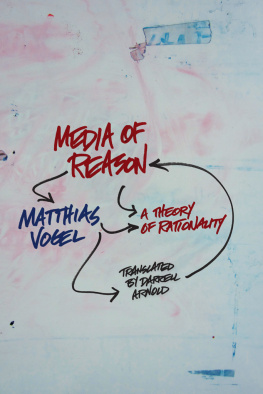Contents
Guide
Pages

Philosophical Introductions
Five Approaches to Communicative Reason
Jrgen Habermas
Introduction by Jean-Marc Durand-Gasselin
Translated by Ciaran Cronin
polity
Chapters 15 first published in German in Philosophische Texte. Studienausgabe in fnf Bnden Suhrkamp Verlag, Frankfurt am Main 2009. All rights reserved and controlled through Suhrkamp Verlag Berlin
Introduction by Jean-Marc Durand-Gasselin Suhrkamp Verlag Berlin, 2018
This English edition Polity Press, 2018
Polity Press
65 Bridge Street
Cambridge CB2 1UR, UK
Polity Press
101 Station Landing
Suite 300
Medford, MA 02155, USA
All rights reserved. Except for the quotation of short passages for the purpose of criticism and review, no part of this publication may be reproduced, stored in a retrieval system or transmitted, in any form or by any means, electronic, mechanical, photocopying, recording or otherwise, without the prior permission of the publisher.
ISBN-13: 978-1-5095-0675-0
A catalogue record for this book is available from the British Library.
Library of Congress Cataloging-in-Publication Data
Names: Habermas, Jrgen, author.
Title: Philosophical introductions : five approaches to communicative reason / Jrgen Habermas.
Description: English edition. | Medford, MA : Polity, 2018. | Includes bibliographical references and index.
Identifiers: LCCN 2017059698 (print) | LCCN 2018015509 (ebook) | ISBN 9781509506750 (Epub) | ISBN 9781509506712 (hardback) | ISBN 9781509506729 (pbk.)
Subjects: LCSH: Philosophy, German--History--20th century. | Communication--Philosophy.
Classification: LCC B3258.H322 (ebook) | LCC B3258.H322 E5 2018 (print) | DDC 193--dc23
LC record available at https://lccn.loc.gov/2017059698
The publisher has used its best endeavours to ensure that the URLs for external websites referred to in this book are correct and active at the time of going to press. However, the publisher has no responsibility for the websites and can make no guarantee that a site will remain live or that the content is or will remain appropriate.
Every effort has been made to trace all copyright holders, but if any have been inadvertently overlooked the publisher will be pleased to include any necessary credits in any subsequent reprint or edition.
For further information on Polity, visit our website: politybooks.com
Preface
On the occasion of my eightieth birthday, Suhrkamp Verlag encouraged me to make a systematic selection of essays on the five main areas on which my philosophical work has focused. I found this initiative very opportune because I have not written any books on important topics to which my philosophical interests, in the narrower sense, are directed. As a result, the individual collections of texts could take the place of unwritten monographs on:
- the foundations of sociology in the theory of language,
- the formal-pragmatic conception of language and rationality,
- discourse ethics,
- political philosophy, and
- the status of postmetaphysical thinking.
The theory of communicative action is so complex that it needs to be defended simultaneously on many different fronts. The foundations of such a social theory are laid down in preparatory studies on philosophical questions, which must not be confused with social scientific questions; rather, they must be respected in their distinctive character. In the highly diverse network of scientific discourses, philosophical arguments can be defended only in the specific contexts in which the associated problems arise. The edition of philosophical essays was intended to throw light on this independent systematic import of philosophical questions. On the other hand, even though these attempts at explanation have to stand on their own two feet as contributions to technical philosophical discussions, at the same time they preserve their status within the more comprehensive context of an ambitious social theory.
In order to render this context transparent, I wrote an introduction to each of the five thematic volumes. In no other place have I attempted to provide an overview of my philosophy, if I may speak in such terms, as a whole. For several decades I have had the vexing experience that, as our discipline becomes inexorably more specialized, my publications are no longer read as attempts to develop a philosophical conception as a whole. Rather than being read as a generalists contributions to certain aspects of the theory of rationality or the theory of action, political theory or the theory of law, moral theory, language pragmatics or, specifically, social theory, they are interpreted in fragmented form. This is why the synoptic view provided by these introductions is close to my heart, without wishing to misrepresent their reference to a specific occasion of publication.
Publishing a series of introductions without the texts to which they refer is, of course, an imposition on the reader, who will if necessary have to track down these texts using the references. Therefore, I am grateful to Jean-Marc Durand-Gasselin for fulfilling my all but impossible request to repair this deficiency. He supplements the introductions, which always refer to specific texts, with a masterful account of my approach from the perspective of a capable French colleague from across the Rhine.
Starnberg, December 2016
Jrgen Habermas
Notes
Jrgen Habermas,
Philosophische Texte, 5 vols (Frankfurt am Main: Suhrkamp, 2009). Citations of the texts discussed in the introductions are printed in
bold.
Introduction
The Work of Jrgen Habermas: Roots, Trunk and Branches
Jean-Marc Durand-Gasselin
The purpose of the present text is to introduce a collection of five essays by Jrgen Habermas, each of which originally served as an introduction to a thematic collection of philosophical articles on a single area of his work. To celebrate his eightieth birthday, Suhrkamp, Habermass main German publisher, offered him the opportunity to devote a collection of articles to each of the most salient developments in his extremely prolific theoretical writings. The volumes covered, in turn, the foundation of sociology in the theory of meaning, the relationship between rationality and the theory of meaning, discourse ethics, political theory and, finally, the critique of reason. Thus, the five introductory essays collected here offer an unusually rich and unparalleled overview of Habermass theoretical construction and, taken together, provide an indispensable guide to the interpretation of his work.
However, these introductions also exhibit four characteristics that are apt to present difficulties for the reader, quite apart, of course, from their very rich intellectual content. The first and second difficulties are bound up with the fact that these are thematic introductions as well as being philosophical introductions in a rather academic sense of the term. Thus, they divide up Habermass work along clear and fairly classical institutional lines. However, this is at odds with the fact that, on the one hand, his work developed in a more organic way out of a central core and, on the other, its methodological point of departure was more interdisciplinary than this institutional division would suggest. A further difficulty is that Habermas tends to present results or developments and elucidations without explaining the underlying research process. Finally, the fourth difficulty is a direct implication of the first three: the introductions discuss articles that stem either from the 1970s (in a very few cases)














